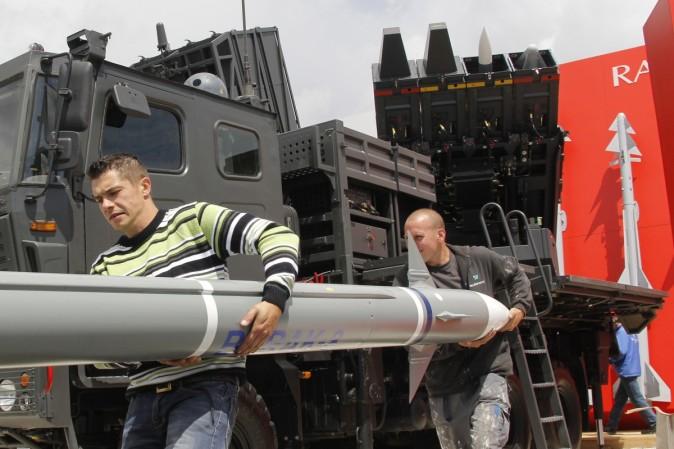
Before winning the 2014 Lok Sabha election, Narendra Modi and promised to make India strong militarily. The BJP leadership spoke about bolstering the armed Forces -- from ramping up the depleting war-time stocks to making India self-reliant in military hardware. Now, after completing more than half of its term in office, the Central government seems to be on a war-footing to boost the weapon stocks in the country.
In what has been perceived to be a strategic move, India has been "secretly" purchasing emergency weapons and ammunitions from abroad -- from countries like Israel and Russia -- two of the top three arms-suppliers to India, the Huffington Post India reported quoting people involved with these developments.
These emergency purchases are said to be costing the coffers about $3billion and include ammunitions of various kinds -- rocket launchers, anti-tank missiles and tank engines. The report has also said that owing to the sensitivity of the issue, the exact nature and quantity of the purchase has not been revealed.
Emergency-time committee has been set up
The Ministry of Defence had set up an "empowered committee" with senior officials with the wherewithal to make "off-the-shelf purchases" of the necessary weapons and ammunitions. The empowered committee can take decisions on the spot; can negotiate their prices and thus cut down the length acquisition process. Such committees are only activated in times of emergency, the report said.
Two such committees were sent to Israel and Russia in 2016 for these purchases. Further, the secret weapon and ammunition deliveries have already begun, the report claimed. Many of them are on their way and India is sending special flights to Israel and Russia to have them airlifted back home.
India has already asked Israel for armed unmanned aerial vehicle (UAV) Heron TP and is testing Barak 8 surface to air (SAM) systems for its navy.

One such empowered committee is also headed to Russia to purchase weaponry for the Indian Air Force. India has already ordered S-400 advanced anti-aircraft defence system, around 200 Kamov 226T helicopters and four Krivak class stealth frigates.
Some of the possible stocks that India is shoring up include high explosive bombs, protective armour for troop carrying vehicles and tanks, anti-personnel grenade-launchers, among others.
Why is India stocking up? Is it preparing for a war?
A report by the Comptroller and Auditor General of India which was tabled in Parliament in 2015 revealed that different types of ammunition India had was not even enough to fight war for 20 days and "in 50 per cent of the types of ammunition, the holding was critical or less than 10 days in March 2013". However, the official policy is that India needs to have ammunition for 40 days of "intense" fighting under the war wastage reserves (WWR).
By July 2016, the Quint reported that the ammunitions would only last 14 days of intense fighting.
India needs to refill its stocks and do it at war-footing and that could be the nature of these secret purchases.
"The emergency purchases are aimed at replenishing and maintaining a minimum level of preparedness for any eventuality," said a senior official at the defence ministry to Huffington Post India.
Secondly, following the recent surgical strikes on terror infrastructure in Pakistan-occupied Kashmir (PoK) by India's special forces, Pakistan has indulged in "aggressive manoeuvring" and it would be "wise" for India to remain "prepared".
India faces threats from two of its neighbours, Pakistan and China, and it has to be prepared for any eventuality.
Apart from undergoing preparation for any misadventure, the Indian armed forces are also experiencing massive modernisation process, whereby it is decommissioning some of its vintage Soviet-era weaponry in favour of modern and sophisticated ones that can give the Chinese a tough fight.
Why is it revising the 'Cold Start' doctrine?
Apart from shoring up the war-time stocks, India is reportedly considering revising its infamous Cold Start doctrine, which was created to counter Pakistan's threats during war.
The Cold Start doctrine involves rapid troop and armoured vehicles movement across the border and attacking the enemy before it could use the nuclear weapon.
Though there is no official confirmation, Defense News has quoted a senior army official saying: "The Cold Start strategy will be discussed in the near future between the top military leadership as part of a new war doctrine."
Indian strategic planners probably want to include aspects of terrorism and nuclear threats that might be part of a future war with Pakistan and China.
"The Cold Start doctrine essentially will prepare for the next wars, which will emerge on short notice, will be of short duration, and will be fought at high tempo and intensity. The doctrine would mean combined operations by air, land and sea forces, which will require greater coordination headed by a senior military official," said Nitin Mehta, a defence analyst, Defense News reported.














